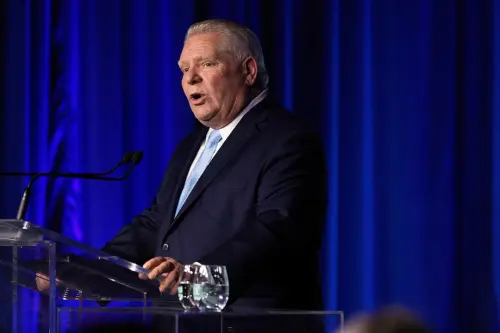Ontario's Progressive Conservative Party has successfully secured an uncommon third consecutive majority, as per a Canadian Broadcasting Corporation projection, marked by a campaign heavily influenced by U.S. President Donald Trump.
The PC Party leader, Doug Ford, sought an early election, citing the necessity for a robust mandate to confront Trump's proposed tariffs. Despite already holding a majority in the provincial legislature, Ford pushed for stronger support.
Ford's opponents struggled to divert attention to scandals surrounding the Progressive Conservative leader and the issues facing the province.
The most populated Canadian province is confronted with challenges in offering adequate healthcare to its over 14 million residents, with approximately 2.5 million lacking a primary care provider—an increase from 1.8 million in 2020.
Criticism was directed at Ford for implying that emergency departments were crowded due to minor ailments. His critics argue that people might have no other access to care.
Ontario, like other regions in Canada, faces housing affordability issues and has fallen short of its housing targets.
In an interview with CTV news prior to his victory speech, Doug Ford stated, "I'll fight tooth and nail against Donald Trump." The province, housing about 35% of Canada's 40 million residents, stands as one of the world's largest sub-sovereign borrowers.
Trump's policy decisions have stirred up Canadian politics at both provincial and national levels, with pressure mounting for an upcoming federal election.
Ford, alongside opposition leaders Marit Stiles of the New Democratic Party and Bonnie Crombie of the Liberal Party, has voiced dissent against tariffs and potential annexation, affirming "Canada is not for sale."
Ford’s decision to call for an election was a gamble to secure another majority, noted Laura Stephenson, a politics professor at Western University.
The winter election in Ontario was atypical, with parts of the province grappling with snowstorms on election day. By 10 p.m. ET, voter turnout stood at 42.62%, with the previous election in 2022 marking a record low of 44%.
John Beebe, Director of the Democratic Engagement Exchange at Toronto Metropolitan University, expressed disappointment over possible lower voter turnout indicating concerns about the health of democracy.
Ontario's election outcome may provide insights for federal politics in Canada, observed University of Toronto politics professor Semra Sevi, suggesting potential implications for the federal Liberals amid shifting political dynamics influenced by external events such as Trump's tariffs.
